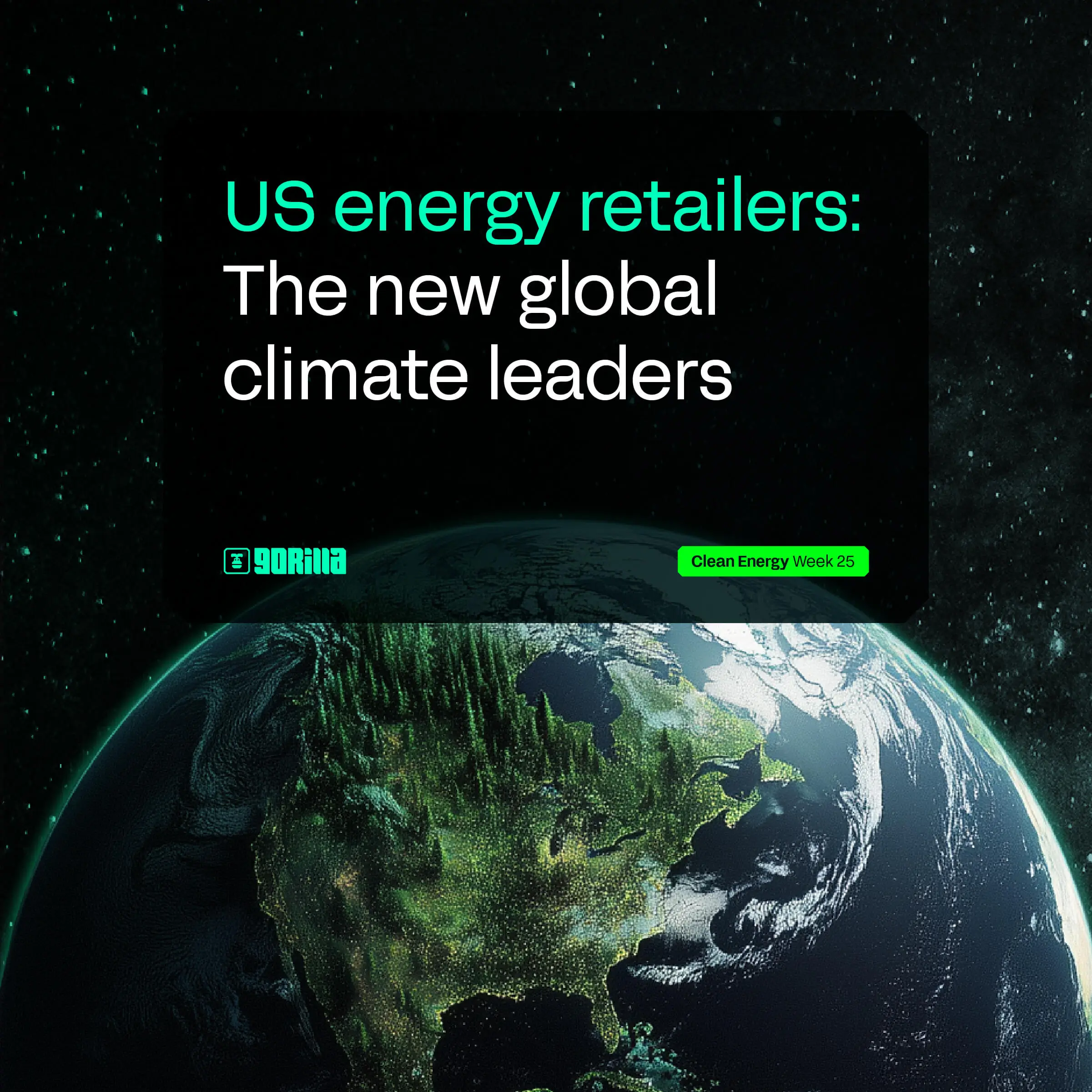Data management and the transition to net zero might not seem like the most obvious partners, but at Gorilla we believe that they have the potential to drive each other forward in exciting ways. As the use of AI, SaaS tools, and cloud services expands, so does the demand for data centers—facilities that currently require substantial amounts of energy. However, even as energy demands grow, the switch to renewable, non-polluting sources of power will drive a move towards net zero emissions. As long as the energy industry can bring renewable generation to customers faster than the growth in energy demand, a sustainable future is within reach. The key to making this transition rapid and effective? The answer is data.
In some respects, transitioning to low and no-carbon sources of energy looks quite simple - turn off the coal and gas plants and switch to wind, solar, and nuclear (among others). However, the complexity of modern electricity networks and industry structures means that the transition is vastly more complicated. To manage this complexity, a great deal of analytics, forecasts, and data processing will be required to produce effective results, at every stage of the transition, from generation to retail.
Gorilla was founded with the intention of helping energy retailers to navigate their data landscape. By empowering energy data management, retailers will be able to reinvent their offerings in order to align financial goals with net zero. Gorilla is just one part of the overall solution needed for net zero, but we aim to play an important part in unlocking the potential of data across the energy industry.
In this blog, we will detail the challenges that prevent effective data management in the energy industry and the opportunities available to energy retailers and the wider industry, which Gorilla is helping to facilitate. This will demonstrate that effective data management is the foundation for energy companies' transition to net zero
The Current State of Energy Data
Energy is an old, traditional industry: even if you take the starting point as the market liberalizations that occurred across much of the Western world in the 1990s, it is still an industry that operated before the spread of the internet, before mobile phones, and even before computers spread to every part of business operations. In the retail space, “snail mail” and phone calls will still be widespread for dealing with customers. As such, the adoption of modern technology and approaches to data has been slow, with entrenched opinions and processes that are resistant to change.
For a long time, the industry survived just fine like this. A generation mix consisting largely of fossil fuels and some nuclear offered plenty of stability. This kept grids relatively simple, with very few intermittent renewables and no distributed energy resources (DERs) or microgrids to account for. Energy products were basic, perhaps only offering day/night tariffs to residential customers and a few more options to C&I.
The combination of the rapid growth in technological capabilities with the need for net zero changed all this. In the UK, US, EU, and Australia, regulators and utilities moved to implement smart meters, overhaul the generation mix with low and no-carbon options, unleash the potential of DERs, and bring retail products and services into the 21st century.
The switch to renewables offers the biggest data challenge - but also the biggest opportunities. To manage the financial risk of the resulting increase in energy price volatility, the amount of data in the energy market is exploding. Smart meter adoption is reaching a critical point, and regulations are driving data availability and incentives to leverage this data to hit society’s net-zero targets. Effective use of all of this extra data could power more accurate forecasts and personalisation for the end consumer, if retailers can grasp the opportunity.
Operational efficiency is no less important. Data technology has quickly matured to enterprise level. Enterprises are recognizing the value of data-driven insights for decision-making. IT budgets are increasingly being directed towards data, AI, and predictive analytics. Small gains in how data is stored and processed can lead to big savings in cost and use of energy down the line.
Nonetheless, tools and practices in use at energy companies are still far behind where they need to be. In every region that Gorilla operates in, we have seen companies that have struggled to digitize legacy processes, are reliant on outdated systems like Excel spreadsheets, and have failed to create a data model that is robust, forward-thinking, and open.
It can be difficult to understand the sheer scale of data processing that energy companies are already required to perform. Consider a single firm, pricing products for just residential or just I&C customers. Pricing of products is just one part of energy retail, which as we stressed is just one part of the overall energy transition. Yet inputs for pricing models for such a firm will use databases that contain billions of entries, running to tens of gigabytes. A complete pricing model can literally take weeks to finish calculations if the wrong tools are chosen for the job. In typical periods, hours or days to produce a quote for a customer has become an accepted part of doing business.
Now imagine this level of process extended to both residential and C&I, to forecasting, to trading & risk, to billing. Is it any wonder that retailers across the globe have been reluctant to embrace smart meter opportunities or produce tariffs for EVs which come with further demand for data management?
Data Management Opportunities in Energy Retail
Where challenges exist, so do opportunities. Energy retailers stand at the forefront of the consumer interface in the energy sector, making them uniquely positioned to leverage data management for the transition to net zero. As the energy landscape evolves, retailers have access to vast amounts of consumer data that, when properly managed and analyzed, can drive significant changes in energy consumption patterns and promote sustainability.
One of the primary opportunities lies in personalized energy management services. By analyzing historical usage data, weather patterns, and individual household characteristics, retailers can provide tailored recommendations to consumers for reducing their energy consumption. This might include suggesting optimal times for using high-energy appliances or recommending energy-efficient upgrades.
Another key area is demand response programs. Data management systems allow retailers to forecast peak demand periods with greater accuracy. By communicating this information to consumers and offering incentives for reducing usage during these times, retailers can help balance the grid, integrate more renewable energy, and reduce reliance on carbon-intensive peaker plants. Dynamic pricing has become a buzzword in many energy markets but has had limited impact so far, as retailers fail to make the case for it. Partly, this is a data issue; if retailers can’t effectively predict and react to real-time pricing, then dynamic pricing will be little better than current tariff options. Real-time data analytics can make these programs more dynamic and effective, responding to grid conditions as they change.
Lastly, improved data management allows energy retailers to better support the adoption of DERs like rooftop solar and home batteries. By analyzing consumption patterns, solar generation data, and grid conditions, retailers can help customers optimize their DER investments and operations. This not only benefits individual consumers but also contributes to grid stability and increased renewable energy integration.
These data-driven approaches not only contribute to sustainability goals but also enhance customer engagement and satisfaction. As energy retailers become more adept at managing and utilizing data, they transform from mere suppliers into trusted energy advisors, playing a crucial role in encouraging a broader net-zero transition.
What can retailers achieve?
Your data is an asset, and your data processing applications are tools. On their own, they won’t accomplish anything. Aiming to achieve net zero with the help of data management is a noble aim, but like any business objective it needs to be undergirded with goals and key results. KPIs for data and net zero, if you will.
There are dozens of potential data-powered innovations, as listed above. We haven’t even delved into the possibilities in generation or grid management. It would be easy to end up unfocused: just look at the current state of smart meters. The potential is great, but around the world the rollout of smart meters has yet to deliver much tangible benefit to retailers or residential consumers. In other industries, “big data” has overpromised and underdelivered, with companies throwing money at one-size-fits-all data solutions that don’t have a clear purpose or lack compatibility with industry needs. The opportunities available need to be tackled with care, with alignment between teams, tools, and partners.
Even here at Gorilla, we are not trying to do everything. You could throw a data cloud at every challenge you face and end up achieving nothing. For Gorilla, there is a clear path from data to net zero delivered by specific applications. Gorilla’s data cloud powers applications for pricing and forecasting in energy retail. When a retailer wants to develop 100% renewable tariffs, or dynamic tariffs that respond to renewable availability, Gorilla’s pricing applications are ready to enable this.
If a retailer seeks better forecasting leading to smarter load balancing and greater operational efficiency, Gorilla is ready to help. The Gorilla platform is continually evolving and will certainly have more capabilities in the future, but everything we do with our partners and customers remains tied to our core mission. There is a joined-up, industry specific approach.
What the industry needs to do next
We have only scratched the surface of data challenges within the energy industry so far, but no one wants to read a 10’000 word blog. We’ll finish part 1 here; next time, we’ll delve into how Gorilla really works to deliver on our mission to transform data management for energy retailers and in doing so deliver on net zero commitments.



.png)
